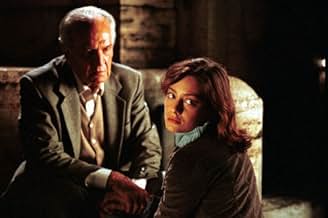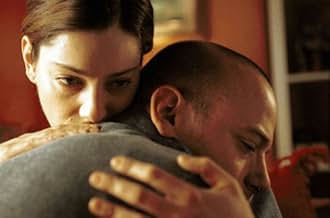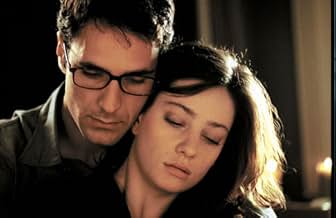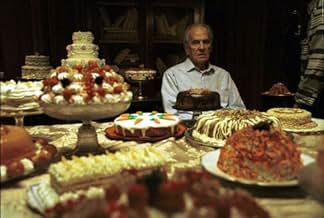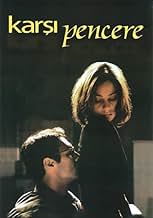
Play clip2:59
Watch Facing Windows Scene: I Don't Taste Things As Good As I Once Did
Overburdened and stuck in a greying marriage, Giovanna takes to caring for the Jewish Holocaust survivor her husband brings home. As she begins to reflect on her life, she turns to the man w... Read allOverburdened and stuck in a greying marriage, Giovanna takes to caring for the Jewish Holocaust survivor her husband brings home. As she begins to reflect on her life, she turns to the man who lives across from her ...Overburdened and stuck in a greying marriage, Giovanna takes to caring for the Jewish Holocaust survivor her husband brings home. As she begins to reflect on her life, she turns to the man who lives across from her ...
- Director
- Writers
- Stars
- Awards
- 34 wins & 24 nominations total
Antonella Antinori
- Tintora
- (as Veronica Bruni)
Ohame-Brancy Chibuzo
- Alessio
- (as Ohame Brancy Chibuzo)
- Director
- Writers
- All cast & crew
- Production, box office & more at IMDbPro
Featured reviews
Having seen all of Ferzan Ozpetek's films, I looked forward seeing this new picture, which just started a commercial run locally. Without a doubt, this is even more complex than the ones before. Mr. Ozpetek is a director that shows great talent. He has worked in the screen play as well.
This is a film that presents two stories that are completely different from one another. The beginning of the movie takes us back to 1943 Rome, at the height of the war. We witness what happens in the opening sequence without any knowledge of how will it play in the total outcome of the picture.
The film then changes to present day Rome. We see Giovanna and Filippo, who are struggling to make ends meet. They meet one day a mysterious old man who is trying to give them money. They end up bringing him home since the local police can't do anything. This man, Simone, has the clue to the puzzle of the first part of the film, but that will come at the end.
Giovanna's marriage to Filippo is in danger of failure. Giovanna suddenly discovers a life in the apartment across the street. Lorenzo, who lives alone, turns out has been spying on Giovanna as well. They get to meet, but common sense prevails and their possible relationship never amounts to anything.
Giovanna Mezzogiorno is one of Italy's leading actresses. Not only is she attractive, but she can act, as well. Miss Mezzogiorno has one of the most expressive and beautiful eyes we have seen in a long time. Not only that, but she expresses so much by looking directly into the camera.
Massimo Girotti, another great figure in the Italian movies is the mysterious Simone, who in reality is Davide, a master dessert chef who owned one of Rome's most prestigious pastry shop. Mr. Girotti's magnificent presence in the film makes the most with his pivotal role.
The film is deeply satisfying. Another great film by Ferzan Ozpetek.
This is a film that presents two stories that are completely different from one another. The beginning of the movie takes us back to 1943 Rome, at the height of the war. We witness what happens in the opening sequence without any knowledge of how will it play in the total outcome of the picture.
The film then changes to present day Rome. We see Giovanna and Filippo, who are struggling to make ends meet. They meet one day a mysterious old man who is trying to give them money. They end up bringing him home since the local police can't do anything. This man, Simone, has the clue to the puzzle of the first part of the film, but that will come at the end.
Giovanna's marriage to Filippo is in danger of failure. Giovanna suddenly discovers a life in the apartment across the street. Lorenzo, who lives alone, turns out has been spying on Giovanna as well. They get to meet, but common sense prevails and their possible relationship never amounts to anything.
Giovanna Mezzogiorno is one of Italy's leading actresses. Not only is she attractive, but she can act, as well. Miss Mezzogiorno has one of the most expressive and beautiful eyes we have seen in a long time. Not only that, but she expresses so much by looking directly into the camera.
Massimo Girotti, another great figure in the Italian movies is the mysterious Simone, who in reality is Davide, a master dessert chef who owned one of Rome's most prestigious pastry shop. Mr. Girotti's magnificent presence in the film makes the most with his pivotal role.
The film is deeply satisfying. Another great film by Ferzan Ozpetek.
One of the greatest Turkish directors ever, Ferzan Ozpetek has long proved himself as a director who doesn't only make good films but also makes them his own. With the elegant cast, the wonderful soundtrack and a cleverly knit story, La Finestra di Fronte is no exception to his brilliant movie-making.
Beginning with the suffocatingly ordinary life of a young couple in Rome and developing as the couple host a stranger, an old man in their house and the lead actress' "improper" attraction to a stranger about whom she knows nothing; the story unfolds into the impossibility of two parallel love stories. The story of two young men during the Nazi suppression; and that of a man and a married woman; two relations both of which are considered highly immoral in their respective environments.
Through the flashbacks, we are taken back to how love finds a way in a country under occupation and we see how the young woman sees her own love's fate in the old man's sad story.
Worth seeing, and seeing again.
Beginning with the suffocatingly ordinary life of a young couple in Rome and developing as the couple host a stranger, an old man in their house and the lead actress' "improper" attraction to a stranger about whom she knows nothing; the story unfolds into the impossibility of two parallel love stories. The story of two young men during the Nazi suppression; and that of a man and a married woman; two relations both of which are considered highly immoral in their respective environments.
Through the flashbacks, we are taken back to how love finds a way in a country under occupation and we see how the young woman sees her own love's fate in the old man's sad story.
Worth seeing, and seeing again.
Sadly, this type of film is all too rare.
Without the relying on clichéd plot-devices, it achieves a striking level of dramatic intensity through character and relationship development. You care what happens to them as if you knew them personally and thats why it works.
As soon as the credits began to roll, I immediately wanted to watch the film all over again. It left me with so many questions and thoughts, about my own life- a cinematic version of Coelho's Alchemist?
For me, the recurring theme in the film, is choices- life choices- forks in the road- and the consequences our decisions yield.
1. Davide stalling on the cobbled stoned streets- torn between his lover and his town. 2. Giovanna and Filippo on the bridge, arguing whether they should get involved with the strange old man. 3. Giovanna and the two men in her life. 4. Giovanna at window in Lorenzos house having a crisis of conscience. 5. Lorenzo taking up the work opportunity, instead of staying in Rome. 6. Giovanna changing careers. 7. Giovanna running down the steps at the end- mirroring the opening scene of the film, she becomes Davide's character in that she makes the ultimate sacrifice for her family. Although we are never told it directly, we realize afterwards that Davide has died- In the way that Giovanna talks about him; saying she misses him now he's gone. "Does everyone that leaves you, leave something of themselves behind". Giovanna says that she hears him in HER voice, and feels him in her gestures. The symmetry of this film is what makes it so beautiful and complete.
The message? Follow your passion, follow your heart and you will have no regrets Something that really made me think was the line Davide said to Giovanna- " You have turned your passion into a hobby. You should never do that with a talent" So finally Giovanna finds her true love- her liberation from a life she no longer loves.
Another element that adds to the realism is the dialogue- From the electrifying opening argument between the two lovers, to the smart quips of the brainy daughter, every character is given a chance to shine. Such a relief from the typical Hollywood crap we are forced to endure.
Everything about this films, seems to linger long after you leave the cinema. The visual beauty, the score, Giovanna's beautiful eyes, the scenery- a true delight of a film that I love recommending to friends.
Without the relying on clichéd plot-devices, it achieves a striking level of dramatic intensity through character and relationship development. You care what happens to them as if you knew them personally and thats why it works.
As soon as the credits began to roll, I immediately wanted to watch the film all over again. It left me with so many questions and thoughts, about my own life- a cinematic version of Coelho's Alchemist?
For me, the recurring theme in the film, is choices- life choices- forks in the road- and the consequences our decisions yield.
1. Davide stalling on the cobbled stoned streets- torn between his lover and his town. 2. Giovanna and Filippo on the bridge, arguing whether they should get involved with the strange old man. 3. Giovanna and the two men in her life. 4. Giovanna at window in Lorenzos house having a crisis of conscience. 5. Lorenzo taking up the work opportunity, instead of staying in Rome. 6. Giovanna changing careers. 7. Giovanna running down the steps at the end- mirroring the opening scene of the film, she becomes Davide's character in that she makes the ultimate sacrifice for her family. Although we are never told it directly, we realize afterwards that Davide has died- In the way that Giovanna talks about him; saying she misses him now he's gone. "Does everyone that leaves you, leave something of themselves behind". Giovanna says that she hears him in HER voice, and feels him in her gestures. The symmetry of this film is what makes it so beautiful and complete.
The message? Follow your passion, follow your heart and you will have no regrets Something that really made me think was the line Davide said to Giovanna- " You have turned your passion into a hobby. You should never do that with a talent" So finally Giovanna finds her true love- her liberation from a life she no longer loves.
Another element that adds to the realism is the dialogue- From the electrifying opening argument between the two lovers, to the smart quips of the brainy daughter, every character is given a chance to shine. Such a relief from the typical Hollywood crap we are forced to endure.
Everything about this films, seems to linger long after you leave the cinema. The visual beauty, the score, Giovanna's beautiful eyes, the scenery- a true delight of a film that I love recommending to friends.
"Facing Windows (La Finestra di fronte)" is like a very European and more sophisticated take on "The Notebook," as it shifts between romantic and culinary past and present through the in-and-out consciousness of an elderly man.
The "Rear Window" eroticism is just one element that accidentally brings together tangled, stymied lives swirling around lovely, exhausted, frustrated chef, wife and mother Giovanna Mezzogiorno, where each child, man, woman, friend and neighbor has separate priorities and fantasies that annoying real life interferes with, from the practical to the political.
Each character and their ties are both delightfully and surprisingly complex and the actors are so comfortable bringing each to complete life that you think you too should be able to come out of the theater speaking Italian so naturally.
But this is a frank, gritty, contemporary, urban Italy we don't usually get to see, with multi-racial immigrants, underemployment and a Fascist past.
The sentimentalism of the live with no regrets lesson is leavened by the seriousness of the final revelations and the compromises that each character still makes.
The music selections nicely fit each character.
The "Rear Window" eroticism is just one element that accidentally brings together tangled, stymied lives swirling around lovely, exhausted, frustrated chef, wife and mother Giovanna Mezzogiorno, where each child, man, woman, friend and neighbor has separate priorities and fantasies that annoying real life interferes with, from the practical to the political.
Each character and their ties are both delightfully and surprisingly complex and the actors are so comfortable bringing each to complete life that you think you too should be able to come out of the theater speaking Italian so naturally.
But this is a frank, gritty, contemporary, urban Italy we don't usually get to see, with multi-racial immigrants, underemployment and a Fascist past.
The sentimentalism of the live with no regrets lesson is leavened by the seriousness of the final revelations and the compromises that each character still makes.
The music selections nicely fit each character.
An Italian movie that starts as a pleasant but otherwise unremarkable tale of a nine year old marriage and an old man wandering the streets with no memory and a pocketful of money. We are drawn in by the rather lovable (if all too human and imperfect) characters until, half way through, the film explodes with moments of real beauty, passion and tenderness. The cinematography deftly weaves flashbacks and fleeting glances from within the minds of the main characters, their memories merging seamlessly for a few moments with the real life around them. The script contains gems that you want to remember.
Italian star Giovanna Mezzogiorno is superb as the wife who seems to be locked in a constant struggle with her husband and attracted to the man in the apartment facing theirs. But Facing Window proves to be far more than melodrama triangle: echoes of the Nazi holocaust and the inner strength to realize one's true feelings, as well as one's true calling ... 'it isn't enough to dream about a better life, you must demand it.' For those who like something more substantial to their cinema than popcorn and nachos, Facing Window fits the bill with effortless grace.
Italian star Giovanna Mezzogiorno is superb as the wife who seems to be locked in a constant struggle with her husband and attracted to the man in the apartment facing theirs. But Facing Window proves to be far more than melodrama triangle: echoes of the Nazi holocaust and the inner strength to realize one's true feelings, as well as one's true calling ... 'it isn't enough to dream about a better life, you must demand it.' For those who like something more substantial to their cinema than popcorn and nachos, Facing Window fits the bill with effortless grace.
Did you know
- TriviaMassimo Girotti died on 6 January 2003 and the movie is dedicated to his memory. Before he was cast, Ferzan Özpetek had considered also Jean Rochefort and Serge Reggiani for his role.
- SoundtracksLa Finestra di fronte
Written by Andrea Guerra
- How long is Facing Windows?Powered by Alexa
Details
- Release date
- Countries of origin
- Official sites
- Language
- Also known as
- The Window Opposite
- Filming locations
- Ponte Sisto, Rome, Lazio, Italy(where Giovanna and Filippo meet Simone)
- Production companies
- See more company credits at IMDbPro
Box office
- Gross US & Canada
- $543,354
- Opening weekend US & Canada
- $36,061
- Jun 20, 2004
- Gross worldwide
- $15,535,312
- Runtime
- 1h 42m(102 min)
- Color
- Sound mix
- Aspect ratio
- 2.35 : 1
Contribute to this page
Suggest an edit or add missing content





